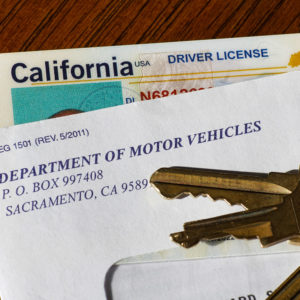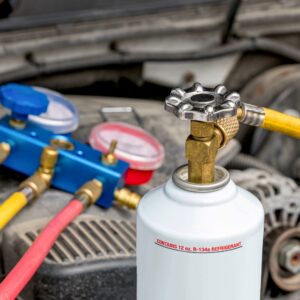You must register your new car before you can drive it on public roads. To do that, you will have to present several documents to your state’s Department of Motor Vehicle (DMV).
Is the driver’s license included in the list of requirements? Can you register your car without it?
Registering a Car Without a Driver’s License
Whether you can register your car without a driver’s license or not depends on the state you live in. Car registration requirements can vary per state.

You don’t need a driver’s license to own a vehicle, which is why some states let people register a vehicle without a license.
Also, there are special cases that are taken into consideration. A good example is car owners who don’t have a driver’s license because of a physical or mental limitation that’s keeping them from driving. They usually rely on caregivers to drive them.
What Are Vehicle Registrations For?
Before discussing the ins and outs of car registration, let’s first start with the basics.
A car registration refers to a certificate or document that you receive after registering a vehicle with your state’s DMV. States usually use car registration data when determining vehicle ownership, tracking criminals, or assessing taxes.
All 50 U.S. states and the District of Columbia have vehicle registration requirements. Keep your vehicle registration with you whenever you’re behind the wheel because law enforcement might ask for it during vehicle inspections and traffic stops.
When Will You Need to Obtain a Vehicle Registration?
You must register your vehicle after buying it or moving to another state. You also need to renew your vehicle registration before it expires.
The expiration date depends on the state it’s registered. For example, in some states, vehicle registrations expire in one year, while in others, they expire after two years.
First-Time Registration vs. Renewal
The process of registering your vehicle for the first time usually takes longer than just renewing a registration. The first-time registration process usually involves presenting a handful of documents as well as paying fees and taxes.
Meanwhile, most states don’t require a lot of documents when renewing a car’s registration. In most cases, you’ll only need your vehicle’s identification number (VIN), license plate number, and driver’s license number.
Requirements for First-Time Car Registration
The requirements for registering your new car can vary depending on the state. They usually include the following:
- The vehicle’s title
- The vehicle’s proof of insurance
- Proof of your identity (driver’s license or other valid identification)
If you’re registering your vehicle for the first time, make sure to check the requirements by checking out your state’s DMV website or inquiring via phone or email.

California Car Registration Requirements
Let’s take California as an example. Here are the requirements you’ll need to prepare if you’re registering a new vehicle in this state.
- If your vehicle is new, you’ll need to complete the Application for Title Registration Form (REG 343). If you’re registering a used vehicle bought from a dealership, you’ll need to make sure you have a California Certificate of Title or an out-of-state title if the vehicle was previously registered in another state.
- You may also need to complete a Vehicle Transfer and Reassignment (REG 262) form and a Statement of Facts (REG 256) form.
- You’ll also need a smog certification and a Vehicle Emission System Statement (REG 139 form.
- If you’re purchasing a commercial vehicle, you’ll need a Declaration of Gross Vehicle Weight (GVW) or Combined Gross Vehicle Weight (CGW) (REG 4008) form.
- You’ll also need to prepare money for taxes and other fees.
Take note that these requirements apply to vehicles that were bought through a dealership.
It’s important to note that the dealers usually handle some parts of the registration process. They’re usually permitted to process title transfers and issue a temporary registration to use until the registration process is done.
Unfortunately, if the dealership where you bought your vehicle doesn’t offer these services, you’ll have to do the whole process yourself.
Can You Register a Car Without a License In California?
Yes. You won’t need a driver’s license to register a vehicle in California, but you’ll be asked to provide an alternative proof of identity and other supporting documents.
However, even if you can register it, you can’t really do anything with your vehicle if you don’t have a driver’s license. If you’re the one driving, make sure you get a driver’s license before going through the whole process.
Can I Process My Car’s Registration Online?
Some states let you register your car online.
In California, for example, you can process your registration renewal online. You’re only going to need your ride’s license plate number, VIN, and payment information. You’re going to need a renewal notice confirming your current address.
You can check your state’s DMV website to know if they also allow vehicle registration online.
How Long Does It Take to Register a Vehicle?
It usually takes one business day if you do the registration process in person. It will take around an hour or less depending on how busy the DMV service center is.
Online renewals usually take several minutes to complete.
The official registration documents and registration sticker will usually be sent through the mail, which takes around 30 days. But again, it can vary depending on your state’s DMV.
How Much Does a Car Registration Cost?
The cost of registering your car varies depending on the state and town you’re in. Most registrations involve both a state and municipal fee, which can total $100 or more, depending on factors like your vehicle’s weight, age, and market value. Some states charge a flat fee.
Any information provided on this Website is for informational purposes only and is not intended to replace consultation with a professional mechanic. The accuracy and timeliness of the information may change from the time of publication.


















